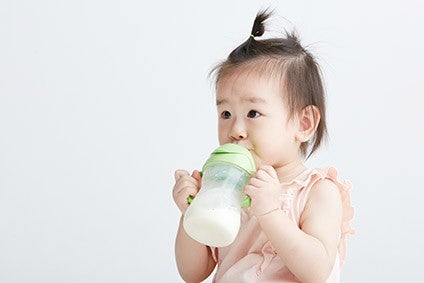
UK-based consumer goods group Reckitt Benckiser is to review its baby-formula business in China.
Reckitt acquired the operation from Mead Johnson in 2017 and the business accounts for about 6% of sales at the company.

Discover B2B Marketing That Performs
Combine business intelligence and editorial excellence to reach engaged professionals across 36 leading media platforms.
In commentary accompanying the release of Reckitt’s 2020 results today (24 February), company CEO Laxman Narasimhan said: “We are … taking decisive action to strengthen our portfolio with a strategic review of the infant-formula business in Greater China already underway.”
Last February, Reckitt booked a writedown of more than GBP5bn (US$7.05bn) thanks to weaker prospects for growth for the infant and child nutrition arm in China.
In a review of Reckitt’s divisions issued today, the company added: “The Greater China business remains a focus area for the group as we seek to improve operational performance and continue our review and analysis of strategic options. We will provide further updates through 2021.”
Reckitt said the performance of its infant-formula business in China, which represents around 25% of its nutrition division, was adversely affected by ongoing restrictions on cross-border trade activity between Hong Kong and mainland China.

US Tariffs are shifting - will you react or anticipate?
Don’t let policy changes catch you off guard. Stay proactive with real-time data and expert analysis.
By GlobalData“In mainland China itself, a steady market share performance in the first few quarters of the year was offset by a challenging fourth quarter where, as expected, sales were adversely affected by increased price competition, particularly in the large mother and baby store channel,” it said.
“We continue to compete well with our multinational peers and grow share in the high-premium and super-high-premium market. However, a slowing rate of premiumisation and more competition from local suppliers is expected to reduce growth opportunities in the near term.”
Bruno Monteyne, an analyst with AllianceBernstein, said: "The Chinese infant nutrition industry has had severe structural issues and we are glad to see one of the major international players taking action here."
Overall, Reckitt reported the highest annual revenue growth in its history as the Covid-19 hygiene boom led to surging sales for its cleaning products. Sales last year rose 11.8% on a like-for-like net basis to GBP14bn.
However, sales in its nutrition division remained unchanged on a like-for-like basis at GBP3.28bn.
Reckitt acquired Enfinitas and Enfamil maker Mead Johnson four years ago for US$17.9bn, including debt.
At the time, then Reckitt CEO Rakesh Kapoor described the acquisition as a "significant step forward" in the FMCG group's "journey as a leader in consumer health".
However, before the acquisition Mead Johnson had seen declining sales. Reckitt managed to grow sales for the first two full years after the acquisition but volumes have since come under pressure amid competition in China.
Last week, Nestlé said its infant-nutrition sales in China were "slightly negative" in 2020, partly linked to what Schneider says are declining birth rates and more mothers choosing to breast feed, an issue Nestlé is trying to fix with premium products geared to weaning toddlers.
Danone said its infant formula sales made through cross-border channels in China "continued to contract sharply" in the fourth quarter and were down by around 45%. It pointed to the closure of the Hong Kong border and limits on travel with mainland China. The French giant said that decline was "a sequential improvement" on the previous quarter and added its domestic sales of infant formula in China were returned to growth in the last three months of 2020, rising at a "low-single-digit rate".





